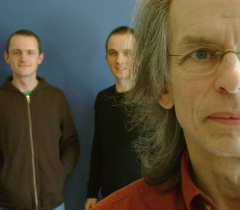Search
Rychard Carrington reports on Steve Howe Trio – The Junction, Cambridge, 16 March 2010

Progressive rock is often accused of pretentious conceit, but I reckon it was more its self-effacing modesty that made the genre one rock critics loved to loathe. Rather than using music as a platform for posture, prog musicians absorbed themeselves in the imtricacies of their music, transferring some of the values of classical music and modern jazz to rock; thereby they developed rock's sophistication to confer upon it a more sutle musical appeal than that of pop. Music above attitude, in other words. Such values were thoroughly and successfully confirmed tonight.
After Pink Floyd, the most popular prog band was Yes. At the centre of Yes's sound was the elegant, fluid guitar of Steve Howe. It promised to be a treat to be able to see Howe in a venue as small as The Junction 2, and to hear his guitar in a different context from Yes or his other rock bands. Howe told us that the motivation for the Steve Howe Trio was his desire to play jazz. To do this he has recruited two really outstanding jazz musicians. One is his own son, Dylan (also a member of The Blockheads). Dylan's drumming was superb throughout. I really don't much like drummers who just plod out a consistent beat, I like drummers who busy themselves intensely: Dylan did just that, throughout the show, including many short solos. Such drumming is crucial in giving this music of a generally relaxing ambience some bite. The other musican is Ross Stanley, who plays the kind of jazzy Hammond organ that inevitably evokes the 1960s (and why not?), and plays it most effectively. Thus there was a great context for Steve's charming and assured guitar work, which was indeed masterly. Steve owns over a hundred guitars, but everything tonight came from just one, which he has owned since 1964.
Several Yes numbers from the early 1970s were included: The Ancient, Mood For A Day, Siberian Khatru, Heart of The Sunrise, Close To The Edge. All of these now sounded quite jazzy, with Ross Stanley's organ so different from Rick Wakeman's. The intricacy behind the flash of Yes in full flourish was brought into clearer light. These numbers didn't sound so different from the compositions by Steve's jazz heroes: Miles Davis, Kenny Burrell, Roland Kirk, Jimmy Smith, Wes Montgomery.
Such music that can appear merely pleasant - backgoround music for classy restaurants - until one relaxes into it and allows oneself to be absorbed into its complex nuancess. Like most truly devoted musicians, Howe allows the music to speak for itself, yet his gentle, self-effacing manner enhances the evening. 'It's been very nice' he told us at the end, and indeed it had been. It felt good to reward him and his able cohorts with a standing ovation.
"We need whacky people just like we need less whacky people," Steve (surely one of the less whacky ones) had said earlier, in relation to his friend Larry, the subject of one of his recent compositions. It's that benign acceptance which wins my vote over punk assertion anytime. So there's attuitude there after all, of a totally un-in-your-face nature. The music matches: gently positive sounds, of an unassuming richness. Good vibes.
Writer: Rychard Carrington